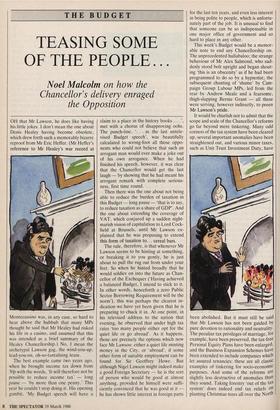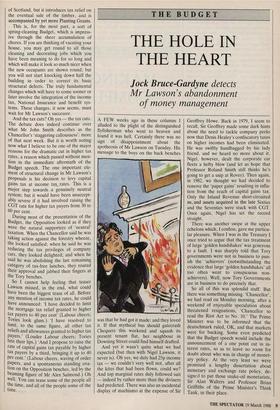THE BUDGET
TEASING SOME OF THE PEOPLE...
Noel Malcolm on how the
Chancellor's delivery enraged the Opposition
OH that Mr Lawson, he does like having his little jokes. I don't mean the one about Denis Healey having become obsolete, which drew forth such a memorably bizarre reproof from Mr Eric Heifer. (Mr Heffer's reference to Mr Healey's war record at Montecassino was, in any case, so hard to hear above the hubbub that many MPs thought he said that Mr Healey had risked his life in a casino, and assumed that this was intended as a brief summary of the Healey Chancellorship.) No. I mean the archetypal Lawson gag. the wind-you-up. lead-you-on, oh-so-tantalising tease.
The best example came two years ago, when he brought income tax down from 30p with the words, 'It will therefore not be possible to reduce income tax' — long pause — 'by more than one penny.' This year he couldn't stop doing it. His opening gambit, 'My Budget speech will have a claim to a place in the history books . . met with a chorus of disapproving oohs.
The punch-line, . as the last untele- vised Budget speech', was beautifully calculated to wrong-foot all those oppo- nents who could not believe that such an arrogant man would ever make a joke out of his own arrogance. When he had finished his speech, however, it was clear that the Chancellor would get the last laugh — by showing that he had meant his arrogant remark with complete serious- ness, first time round.
Then there was the one about not being able to reduce the burden of taxation in this Budget — long pause — 'that is to say, to reduce taxation as a share of GDP'. And the one about extending the coverage of VAT, which conjured up a sudden night- marish vision of capitulation to Lord Cock- field at Brussels, until Mr Lawson ex- plained that he was proposing to extend this form of taxation to... cereal bars.
The rule, therefore, is that whenever Mr Lawson seems to be hinting at something, or breaking it to you gently, he is just about to pull the rug out from under your feet. So when he hinted broadly that he would soldier on into the future as Chan- cellor of the Exchequer ('Having achieved a balanced Budget, I intend to stick to it. In other words, henceforth a zero Public Sector Borrowing Requirement will be the norm'), this was perhaps the clearest in- dication we have yet been given that he is preparing to chuck it in. At one point, in his televised address to the nation that evening, he observed that under high tax rates 'too many people either opt for the quiet life or go abroad'. As it happens, those are precisely the options which now face Mr Lawson: either a quiet life minting money in the City, or 'abroad', if some other form of suitable employment can be found for Sir Geoffrey Howe. But although Nigel Lawson might indeed make a good Foreign Secretary — he is the sort of person who would be good at almost anything, provided he himself were suffi- ciently convinced that he was good at it he has shown little interest in foreign parts for the last ten years, and even less interest in being polite to people, which is unfortu- nately part of the job. It is unusual to find that someone can be so indispensable in one major office of government and so hard to place in any other.
This week's Budget would be a memor- able note to end any Chancellorship on. The unprecedented hullabaloo; the strange behaviour of Mr Alex Salmond, who sud- denly stood bolt upright and began shout- ing 'this is an obscenity' as if he had been programmed to do so by a hypnotist; the subsequent chanting of 'shame' by Cam- paign Group Labour MPs, led from the rear by Andrew Meale and a fearsome, thigh-slapping Bernie Grant — all these were serving, however indirectly, to preen Mr Lawson's pride.
It would be churlish not to admit that the scope and scale of the Chancellor's reforms go far beyond mere tinkering. Many odd corners of the tax system have been cleared up, several important anomalies have been straightened out, and various minor taxes, such as Unit Trust Investment Duty, have
been abolished. But it must still be said that Mr Lawson has not been guided by pure devotion to rationality and neutrality. The peculiar tax privileges of marriage, for example, have been preserved, the tax-free Personal Equity Plans have been enlarged, and the Business Expansion Schemes have been extended to include companies which let assured tenancies: these are all classic examples of tinkering for socio-economic purposes. And some of the reforms are slightly less destructive of anomalies than they sound. Taking forestry 'out of the tax system' does indeed end tax reliefs on planting Christmas trees all over the North of Scotland, but it introduces tax relief on the eventual sale of the timber, and is accompanied by yet more Planting Grants.
This is, for the most part, a sort of spring-cleaning Budget, which is impress- ive through the sheer accumulation of chores. If you are thinking of vacating your house, you may get round to all those cleaning and decorating jobs which you have been meaning to do for so long and which will make it look so much nicer when the new occupants are shown round; but you will not start knocking down half the building in order to correct its basic structural defects. The truly fundamental changes which will have to come sooner or later involve the integration of the income tax, National Insurance and benefit sys- tems. These changes, it now seems, must wait for Mr Lawson's successor.
And the tax cuts? Oh yes — the tax cuts. The debate does indeed continue over what Mr John Smith describes as the Chancellor's 'staggering callousness': more of that next week. But it is worth noting now what I believe to be one of the major reasons for the dramatic cut in higher tax rates, a reason which passed without men- tion in the immediate aftermath of the Budget speech. The one important ele- ment of structural change in Mr Lawson's proposals is his decision to levy capital gains tax at income tax, rates. This is a major step towards a genuinely neutral system; but it would have been unaccept- ably severe if it had involved raising the CGT rate for higher tax payers from 30 to 60 per cent.
During most of the presentation of the Budget, the Opposition looked as if they were the natural supporters of `neutral' taxation. When the Chancellor said he was taking action against the forestry wheeze, the looked satisfied; when he said he was reducing the tax privileges of company cars, they looked delighted; and when he said he was abolishing the last remaining category of tax-free lunches, they roared their approval and jabbed their fingers at the Tory benches.
So I cannot help feeling that teaser Lawson missed, in the end, what could have been the biggest tease of all. Before any mention of income tax rates, he could have announced: 'I have decided to limit the mortgage tax relief granted to higher tax payers to 40 per cent' (Labour cheers; Tories look glum.) 'I have resolved to limit, to the same figure, all other tax reliefs and allowances granted to higher tax payers.' (Louder Labour cheers; Tories bite their lips.) 'And I propose to raise the rate of capital gains tax payable by higher tax payers by a third, bringing it up to 40 per cent.' (Labour cheers, waving of order papers, and a spontaneous standing ova- tion on the Opposition benches, led by the beaming figure of Mr Alex Salmond.) Oh well. You can tease some of the people all the time, and all of the people some of the time...

























































 Previous page
Previous page